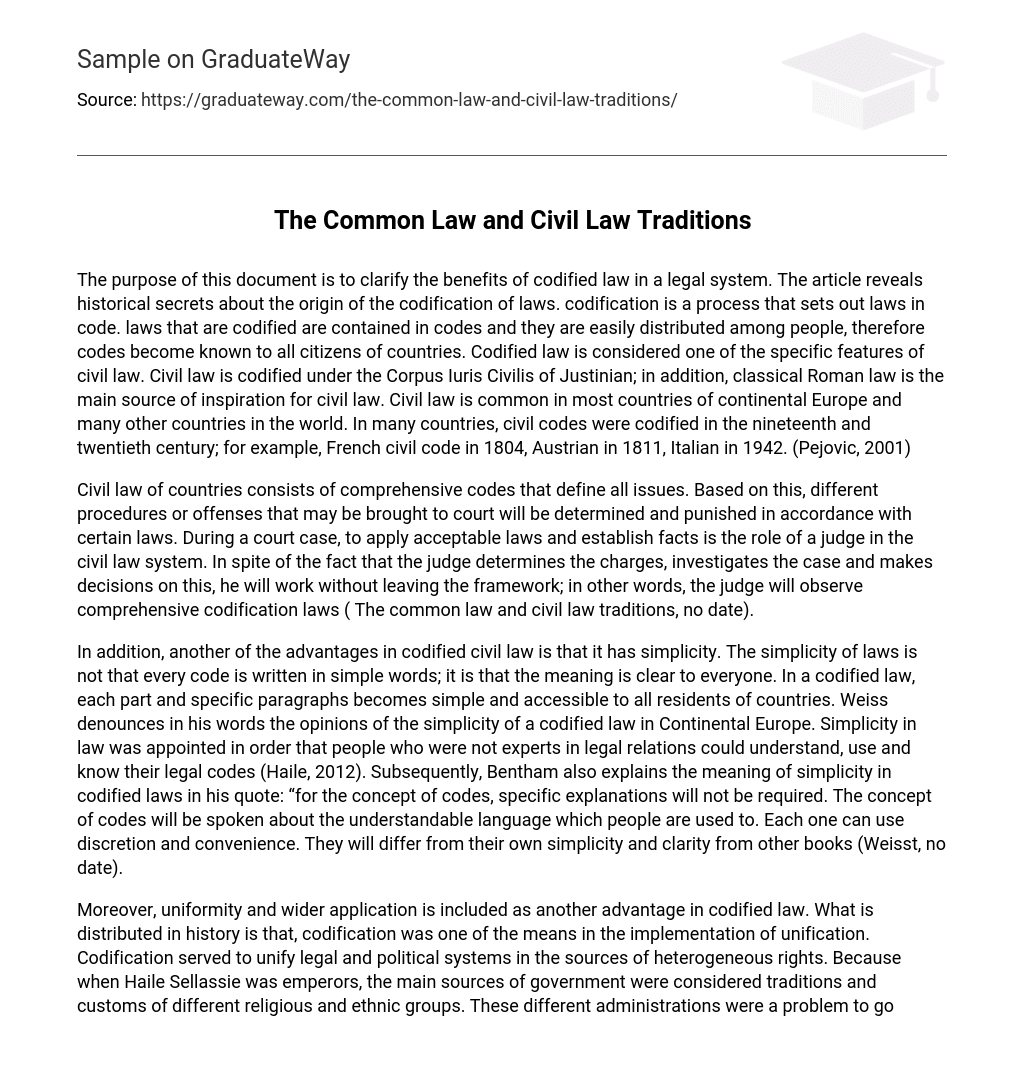The purpose of this document is to clarify the benefits of codified law in a legal system. The article reveals historical secrets about the origin of the codification of laws. codification is a process that sets out laws in code. laws that are codified are contained in codes and they are easily distributed among people, therefore codes become known to all citizens of countries. Codified law is considered one of the specific features of civil law. Civil law is codified under the Corpus Iuris Civilis of Justinian; in addition, classical Roman law is the main source of inspiration for civil law. Civil law is common in most countries of continental Europe and many other countries in the world. In many countries, civil codes were codified in the nineteenth and twentieth century; for example, French civil code in 1804, Austrian in 1811, Italian in 1942. (Pejovic, 2001)
Civil law of countries consists of comprehensive codes that define all issues. Based on this, different procedures or offenses that may be brought to court will be determined and punished in accordance with certain laws. During a court case, to apply acceptable laws and establish facts is the role of a judge in the civil law system. In spite of the fact that the judge determines the charges, investigates the case and makes decisions on this, he will work without leaving the framework; in other words, the judge will observe comprehensive codification laws ( The common law and civil law traditions, no date).
In addition, another of the advantages in codified civil law is that it has simplicity. The simplicity of laws is not that every code is written in simple words; it is that the meaning is clear to everyone. In a codified law, each part and specific paragraphs becomes simple and accessible to all residents of countries. Weiss denounces in his words the opinions of the simplicity of a codified law in Continental Europe. Simplicity in law was appointed in order that people who were not experts in legal relations could understand, use and know their legal codes (Haile, 2012). Subsequently, Bentham also explains the meaning of simplicity in codified laws in his quote: “for the concept of codes, specific explanations will not be required. The concept of codes will be spoken about the understandable language which people are used to. Each one can use discretion and convenience. They will differ from their own simplicity and clarity from other books (Weisst, no date).
Moreover, uniformity and wider application is included as another advantage in codified law. What is distributed in history is that, codification was one of the means in the implementation of unification. Codification served to unify legal and political systems in the sources of heterogeneous rights. Because when Haile Sellassie was emperors, the main sources of government were considered traditions and customs of different religious and ethnic groups. These different administrations were a problem to govern and unite the country; besides this, the same situation was in Ethiopia because there also existed groups of different nations. The emperor’s goal was to create a modern country where the sources of control will be unified. Codified unification was created in order to develop the country and create unity of relations among people from different nations (Haile, 2012). Sequentially, the Napoleon Code was aimed at abolishing the privileges of the clergy and the nobility between citizens and establishing equality. Furthermore, the second goal of codification unity was the development of the country’s economy. The interconnection of relations between different nations has led to the development of trade. In the Reichstag in 1867, the German politician Johannes von Mikel clearly stated about codified unity: “legal unity is one of the conditions of a nation-state” (Smits, no date). Nowadays codified civil laws although exist in many countries, but they are not considered homogeneous. Despite this, they still have specific functions that unite them (Pejovic, 2001).





